Shubha Shankar Kandel, a renowned journalist, analyst, a successful media entrepreneur, the editor in-chief and the chairman of ABC news Television has provided us an opportunity to read an informative, analytical and research based book incorporating new and latest vision on Nepali politics . I would like to congratulate Shubhaji for this opportunity and would like to thank and wish for his success in writing more books like this in the days to come. I hope new books on nationalism, prosperity, new political development with social analysis will come before us. The book is research based and fundamentally has focused on the issues of the Maoist movement of the past, its ups and downs, its safe landing, and the destination of CPN formed with the unification of then UML and Maoist Center. The book has signaled few issues and pointed some of the challenges as well as opportunities before us. We must face the challenges.

People express their worry regarding the originality and sustainability of our party unification. The title of the book itself carries a significant meaning in the political spectrum of Nepal. As Shubhaji has mentioned in the book, it is the landing of many political, social
and economic issues. It is the landing of the system of autocratic monarchy into the system of republic, the landing of our confusion, landing of unity among diversity that is our progress and prosperity and national unity into the point of our unity. Despite many efforts to obstruct our unification by those friends who did not prefer it, all issues got landed. Obviously it moves ahead. I would like to thank the writer for his help from the background and now we have such a valuable book before us.

Very often we can see the effort of resolving the domestic issues pointing the problems with other country. Such tendency can be found in Nepalese politics too. These days Nepal’s nationalism and nationality has landed concretely with a clear policy, clear direction, and clear acknowledgment. I trust for that too and wish for another book to be written. Obviously that will be beneficial for us. What is democracy ? We have concretely landed people’s overall life style, standard of life, social management, political management, cultural to international management, rights to have health facility, civil rights, rights related to security, rights of self dignity, rights to be honored. We have defined it in terms of the destination towards’ Prosperous Nepal, happy Nepali’ and we have legalized it and the nation has landed on it too.


We have stood for the comprehensive democracy with its definition and practice. It is not only political freedom, not confined within only political freedom, but also the overall lives of our people, their life style, and their standard of life in terms of social arrangement. Efforts were made to obstruct the current unification between two communist parties that were ready to land all the misunderstandings and inconsistencies of the past and they are still active in its mission. However, we landed successfully. Shubhaji, the author of this book, extended help to his level best from the backdrop to materialize our dream. I thank him for his endeavor as well.

What is nationalism? Sometimes, it is used as a tool to sort out internal quarrel by pointing out conflict with others. It can be seen in Nepal’s politics as well. There is effort to solve internal problems by pointing to other direction. It appears that when there is problem inside the country, a problem with others is pointed out. A little of nationalism is shown on the periphery. Sometimes we see false nationalism, sometimes narrow nationalism, and sometimes nationalism for the interest of others. Sometimes nationalism or good of the country cannot be uttered. What really is nationalism? What really is Nepalese nationalism in a concrete sense? At present, it has taken a tangible shape, a clear policy, clear direction and clear awareness.

What is democracy, its definition, and conduct? We have spoken of complete and comprehensive democracy. It is not only political liberty or limited to it. Rather it contains the entire life of people, their comprehensive lifestyle, their quality of living, their social management, political management, cultural management, international management, right to health, fundamental rights, “Sanatan” (eternal) rights, right to self-esteem, a right to dignity. We have done tangible “Awataran” of all those liberties and defined them in terms of national goal and economic goal of “Prosperous Nepal, Happy Nepali”. We have accepted them. What is conflict? We had conflict but this book has discussed on this subject more.

Conflict has been managed. We also had conflict in our country. It has been settled. Similarly, many issues have been landed now. Our people have become sovereign. Social awakening and transformation are “Awataran” to real ground. Precisely, that has happened in Nepal today. People have questions about nationalism, democracy, social justice, equality, fundamental rights, equal rights, equal opportunities, security, and social management of dignity. That social justice and equality also have been politically landed. I feel Shubhaji’s book has correctly dealt with these things.

Conflict also has been managed and politically landed along the path of peace in a democratic set-up, and we are moving towards the corridor of stability. I would like to extend Shubhaji , my thanks for this as well. It is not possible to describe in detail all the aspects in a single book. Certain subjects have been emphasized in this book and referred to as “Awataran”. There are similar stories of landing in other subjects. People do raise many questions. Will this happen or be feasible? Some people complain about so many things. I express thanks for criticism and suggestions. All things cannot instantly happen in democracy. We have arranged certain things meanwhile.
In context to the implementation of constitution in a democratic system, all structures have been created in these last seven months. It is not an easy task. In all seven provinces, the offices for the provincial chiefs and the chief ministers, their residences and meeting halls had to be constructed. Democracy is a strong polity. It yields right results if exercised rightly with honesty. I frequently say I will yield to force and will not fight with truth. Truth is itself strong. Truth does not need to be armed. Brahmastra.

I frequently say ‘I ignore force and do not fight against truth. Truth is itself strong. Truth does not need to be armed. B_r_a_h_m_a_s_h_t_r_a_ _is a precise weapon that never misses the target. Rather, once it is discharged, the target is annihilated. Eklavya discharged “_B_r_a_h_m_a_s_h_t_r_a_”_ _against a baby in the womb. The baby had no B_r_a_h_m_a_s_h_t_r_a_ _to defend Eklavya but truth. The baby does not have untruth. That was why the truth repelled B_r_a_h_m_a_s_h_t_r_a_ _that hit Eklavya.He had only truth. That “_B_r_a_h_m_a_s_h_t_r_a_”_ _of truth hit his own forehead. It is a story. The truth is so powerful that he thinks he has fired a “_B_r_a_h_m_a_s_h_t_r_a_”_ _but it hits his own forehead. The truth is so potent. My country people and voters have given majority votes for a stable government. I cannot betray the responsibility bestowed on me ”. I am committed to the country, the people, and their rights. The rights include not only the right of expression but also eating, wearing (clothes), sending kids to school, and medicine for health and protection of such rights. I have been given the responsibility of good governance and livelihood.

I will fulfill these responsibilities. I extend profuse thanks to Shubhaji for this work. The book “A_w_a_t_a_r_a_n_” _is a priceless treasure for the people who would like to understand contemporary Nepalese politics and the unification between the two parties.
Source: Shubha Shankar Kandel, The safe landing (Armed struggle in Nepal, Debate on Transformation, UML-Maoist Unification)
- 1. Views expressed during the book release function on 7 October, 2018


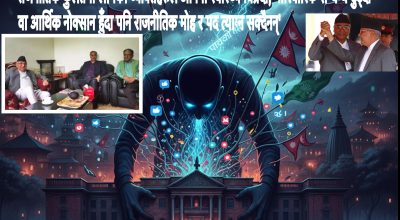
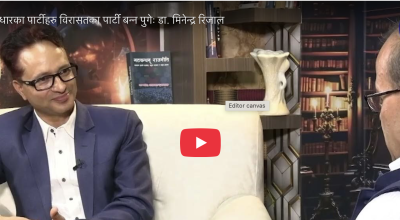
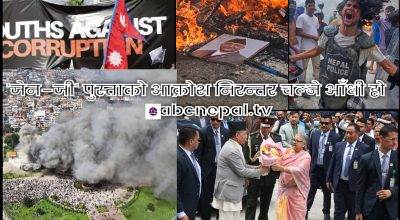
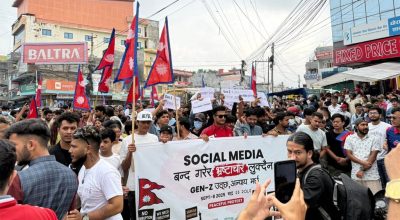
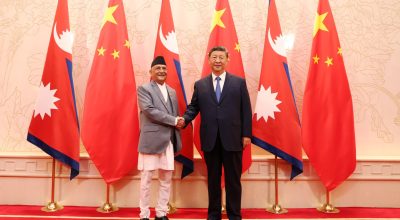
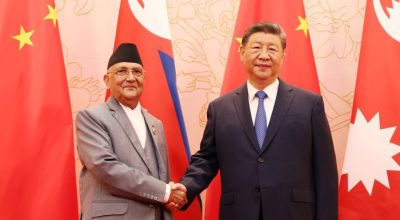
प्रतिक्रिया दिनुहोस्